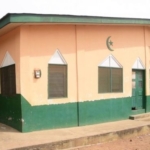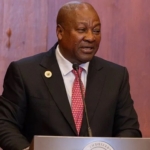
They say motherhood transforms a woman completely. I used to think those wise women were
only talking about physical changes: stretch marks, weight gain, and sleepless nights. But now that
I’ve carried a child, crossed the threshold of life and death, and given birth to a son, I understand
the depth of the change they were referring to.
Motherhood doesn’t just change your body. It reshapes your mind, your emotions, and even your
spirit. Most of all, it changes the way you see the world. Before my baby, all I cared about was
keeping myself alive and safe.
After the baby, all I care about is protecting him from the world,
which can be cruel sometimes. As I keep thinking, I also thought about how I can train my boy to
grow into the kind of man who can make the world safe for others. This thought sparked a single
realization.
One morning, while playing with my eleven-month-old son, this thought struck me sharply: he is
growing so fast. A few months ago, he was a fragile newborn in my arms, crying for milk. Now,
he is strong enough to stand, wobble, laugh, and call out “da-da.” And suddenly, as I thought about
all the conversations around gender equality in Ghana, it hit me: in a society often described as
patriarchal, my son is already judged by his gender before he has even learned what it means to be
a man.
That realization shook me. But being a boy mom gives me an opportunity and responsibility to
raise a son who can help make the world safer, fairer, and more humane.
From Equality to Equity
Before motherhood, equality for women was an idea I debated with my husband, my friends, and
in my own reflections on faith and culture. But now, as I watch my son grow and imagine the kind
of man he will become (a father, a friend, a leader), equality feels different. It feels personal,
urgent, and more complicated.
Growing up, I saw how certain roles were assigned to boys and girls. A friend of my mother had
five sons. None of them ever lifted a hand to help with chores, because her husband had warned
her not to involve ‘his sons in any girly activities in the home.’ He didn’t want to “turn them into
girls.” In many homes, boys were groomed to lead while girls were trained to serve. Boys were
allowed to be messy and bold; girls were praised for being quiet and neat. When anyone switches
roles, society will condemn it.
Research confirms what I witnessed. A research finding from Nartey et al. (2024) reveals that even
though the Ghanaian society has progressed and improved the well-being of women, gender
inequalities persist due to cultural gender norms that favor men and subordinate women.
But one thing I understand and cherish deeply as a Christian woman, and now a mother, is that we
were all created in the image of God (Genesis 1:27). Therefore, we are equal in dignity, but not
created to live identical lives. Our bodies and emotions were made differently, but that doesn’t
make us less of a human.
It only means we function differently, possess different strengths, live different stories, and these differences should be embraced- not belittled or erased. And this is where I have come to see the difference between equality and equity.
Equality treats everyone the same, regardless of their needs. Equity, however, recognizes those needs and
provides what each person requires to thrive. For example, equity says pregnant women need
special care and accommodation if they are to flourish. Equality says pregnant women should be
treated like everyone else, which will not be fair. In a world still fighting for justice, equity, not
equality, is what will take us further.
Why Equity Matters for Both Women and Men
Additional Ghanaian studies show that women continue to be underrepresented in leadership,
politics, and decision-making. However, men also face constraints, being pressured to “man up,”
discouraged from showing vulnerability, and ridiculed for being tender. Equality alone cannot
break these rigid barriers; instead, equity can.
As we passionately push for empowerment, I worry that men might be overlooked. I fear a future
where my son cannot speak freely without fear of censorship, or where he is targeted just for being
a man. If we raise men with resentment, they will try to undo the progress we’ve achieved. Equity
guarantees that no one, whether woman or man, girl or boy, is left behind.
Equity means teaching boys to cry without shame, to clean up after themselves, and to respect
boundaries. It means reminding girls that their voices matter. It means designing schools, workplaces, and churches that accommodate pregnant women, people with disabilities, and anyone disadvantaged by circumstance.
To the Gatekeepers
This change requires all of us.
- Women: For years, we have complained that men are absent at home and uninvolved in
raising children. Yet many of us still send our daughters to the kitchen while our sons play
games on the computer. If we want change, we must model it. Let’s raise men who can
cook, clean, and care because a man who can care for himself can care for his family and
his nation. - Churches: The church must challenge doctrines that are not biblical but perpetuate
inequality. Jesus lifted women; so, should we. Let our pulpits teach that true manhood is
service, not dominance. - Media and Advertisers: Advertising mirrors society. Research Study by Akesse-
Brempong and Cudjoe (2023) on gender stereotypes in advertising shows that gender
stereotypes in media do more than sell products; they shape our understanding of what men
and women should be. If we want to fight inequality and promote equity, we must challenge
stereotypes, not perpetuate them. - Policymakers: Fight for women, yes. But more importantly, fight for equity. Every
Ghanaian life matters, and every Ghanaian deserves the tools to succeed. - Parents and Schools: Rethink the stories we tell children about what it means to be a boy
or a girl. Stop rewarding dominance and punishing tenderness. Teach equity in classrooms, not just equality on paper.
The Future I Pray For
I want my son to grow up in a Ghana where no one is left behind because of where they were born,
how they speak, or the body they live in. A Ghana where we celebrate our differences instead of
fearing them. A Ghana where boys and girls alike have an equal chance to thrive.
That is not just equality. That is equity. And that is the future I am praying for.
The writer, Paulina Bonsu Donkoh is a Ghanaian writer, blogger, and speaker who explores faith,
relationships, motherhood, and personal growth through her platform, RealestTalks.com.
Her reflections blend spirituality and everyday life, inspiring conversations on equality,
family, and the values that shape society.




